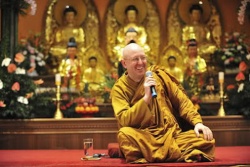Ajahn
Ajahn (Thai: อาจารย์, RTGS: achan, IPA: [ʔāː.tɕāːn], also romanized ajaan, ajarn, acharn and achaan) is a Thai language term which translates as "teacher". It is derived from the Pali word ācariya, and is a term of respect, similar in meaning to the Japanese Sensei, and is used as a title of address for high-school and university teachers, and for Buddhist monks who have passed ten vassa. The Thai word for ‘teacher’; often used as the title of the senior monk or monks at a monastery. This is also spelt ‘achaan’, ‘acharn’ (and several other ways - all derived from the Pali word ‘acariya’).
This lattermost case is usually romanized ajahn. According to the Vinaya, any properly ordained Monk can become an ācariya after ten vassa in the robes, thus a Thai Monk becomes ajahn.
A senior Monk may bear the honorific title phra ajahn (Thai: พระอาจารย์,"Venerable Monk"), or in more informal situations, than ajahn (Thai: ท่านอาจารย์,"Venerable Monk").
Some famous ajahns are:
- Ajahn Ama
- Ajahn Maha Boowa
- Ajahn Brahm
- Ajahn Chah
- Ajahn Khemadhammo
- Ajahn Mun
- Ajahn Munindo
- Ajahn Sumedho
In Thai, such highly esteemed monks would very rarely be called simply ajahn chah, ajahn mun, etc., as there are much more respectful ways for addressing or referring to them.
